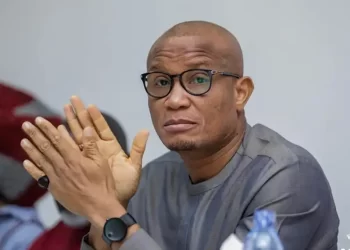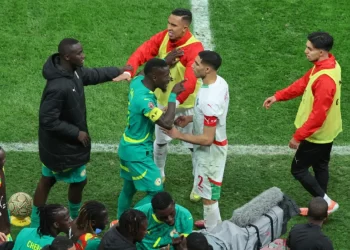The Ghana Water Company Limited (GWL) has uncovered more than 2,700 illegal water connections within the Accra and Tema Metropolitan Area alone over six months, spanning the last quarter of 2024 through the first quarter of 2025.
This staggering number, revealed by GWL officials, is part of a growing national crisis in which unlawful water usage is surging at an alarming rate, threatening revenue generation, damaging infrastructure, and undermining fair distribution of treated water.
The scale and complexity of these illegal connections—ranging from meter bypasses and direct tapping into pipelines to the use of in-line pumps and outright theft of water meters—have placed immense strain on the utility’s ability to operate efficiently.
Officials fear that the trend, unless halted, could jeopardise the company’s ability to invest in critical upgrades, expand access, and maintain a reliable service delivery standard nationwide.
Dr. Hadisu Alhassan, Regional Production Manager for the Accra-Tema Metropolitan Area, emphasised that the impact of these illegalities extends beyond financial loss.
“It compromises the integrity of our infrastructure, disrupts our distribution planning, and creates unfair conditions for paying customers,” he explained.
A deliberate sabotage of revenue and equity
One of the most egregious examples was uncovered at Power Land near Ritz Junction on the Agbogba Road, where investigators discovered a property with three separate water service lines.
Only one of the connections had a meter. The other two lines—completely unmetered—were discovered to be supplying water directly to tanker operators.
Hidden behind a concrete wall, the setup included large underground reservoirs designed to store stolen water and bypass the entire billing system.
“This is a deliberate act that directly undermines our efforts to ensure revenue recovery and fair distribution,” said Ing. Alhassan.
“More importantly, the use of such connections for commercial gain puts an unfair burden on the entire network.”

The investigation and enforcement effort that led to the Power Land discovery was personally supervised by Mr. Eric Biliguo Adama, Board Chairman of Ghana Water Company Limited. His active involvement has been described as a turning point in GWL’s resolve to clamp down on illegal water usage.
“It is refreshing to see our leadership take active steps in enforcement. It sends a clear message that illegalities will not be tolerated,” Ing. Alhassan added.
Water meter theft: A silent crisis
While unauthorised connections often dominate headlines, another growing concern is the rampant theft of water meters, particularly ultrasonic models, which are costly and vital to the company’s metering and monitoring functions.
Since the start of 2025, thousands of water meters have been stolen nationwide.
These thefts, often carried out by organised groups, not only create operational disruptions but also result in thousands of gallons of treated water being lost through unmetered outlets. Without meters, there is no way to account for or regulate usage, compounding the financial losses.
“Meter theft is an economic crime with real consequences for both the utility and customers,” explained Adam Mutawakilu, Managing Director of GWL.
“When a meter is stolen, we lose not only expensive equipment but also the ability to manage usage efficiently.”
Mr. Mutawakilu disclosed that GWL is collaborating with the Ghana Police Service to investigate and prosecute those involved in these thefts. In several instances, the thefts are believed to be linked to syndicates targeting key service zones.
“We are treating this with the seriousness it deserves,” he added. “Every meter stolen is a setback that delays our progress toward full metering and smarter water management.”
National enforcement drive gains momentum
In response to the surge in illegal activities, GWL has rolled out a nationwide revenue protection and enforcement campaign. Regional offices are playing a central role, and some are already seeing results.
In Accra West, more than 800 users who failed to regularise their service during a designated grace period have now been taken to court.
Ms. Solace Akomeah, the region’s Public Relations and Communications Manager, stated, “We gave ample time for users to come forward, and many did, but those who ignored our efforts will now face the legal consequences.
This is about fairness and protecting the integrity of the network.”
Accra East Region
In the Accra East Region, Public Relations Manager Nana Yaw Barima Barnie confirmed that cases of meter bypasses and unauthorised extensions continue to rise.
“These practices lead to service interruptions and make it difficult to plan water distribution effectively,” he observed.
Kumasi
In Kumasi, five individuals were arrested for illegally tapping into pipelines in neighbourhoods such as Denyame, Dakodwom, Kwadaso Estate, and Santasi Apire. The individuals were surcharged, and the amounts have already been recovered.
Speaking on the developments, Mr. Padi Kwabena Narh, Communications Officer for the Ashanti Region, remarked, “Illegal connections reduce our revenue, delay planned projects, and deprive entire communities of water. This campaign is ongoing, and we are determined to root out these infractions.”
Tamale
In Tamale, the crackdown has led to legal action, including the conviction of a 50-year-old businessman, Mr. Ibrahim Baako Alhassan, who illegally installed in-line pumps on GWL pipelines. He was fined GH₵3,600 or 12 months in prison and was bonded to be of good behaviour.

Balancing enforcement with engagement
While GWL remains firm in its enforcement mandate, the company is also mindful of the need to balance law with engagement.
Mr. Mutawakilu reiterated the company’s position that legal action is typically a last resort.
“Before prosecuting, we issue notices, extend grace periods, and educate the public on how to regularise service. Unfortunately, when people continue to ignore these efforts, we are left with no option but to act,” he explained.
In cases where internal collusion is suspected, the company is working closely with security agencies to investigate.
“We are equally focused on internal accountability. Any staff found complicit will face both administrative and legal action,” he warned.
The role of communities in protecting water assets
Looking ahead, GWL is enhancing its public education campaigns to foster a culture of responsible water use and civic vigilance. The company is urging communities to report illegal connections and assist in protecting national water infrastructure.
“Water is a national asset. It’s not just about individual use; it’s about collective stewardship,” Mr. Mutawakilu stated. “When someone taps water illegally, the entire system suffers. That is why we are calling on every Ghanaian to help us protect our pipelines.”
The company is exploring new incentive-based approaches to encourage whistleblowers to report illegal activities, particularly in high-risk communities.
Modernising for the future
Despite the current challenges, GWL remains optimistic about the future.
Investments in smart metering, digital billing platforms, leak detection technologies, and infrastructure upgrades are already underway to modernise operations and improve accountability.
“Our objective goes beyond catching offenders,” said Mr. Mutawakilu. “We’re building a smarter, more resilient water system—one that ensures fairness, efficiency, and long-term sustainability.”
From Tamale to Kumasi, Accra to Agbogba, GWL’s enforcement campaign is not just about stopping theft.
It is about transforming a national utility into a trusted, modern service provider. But that transformation, the company insists, cannot happen in isolation.

“It is not a fight GWL can win alone,” Mr. Mutawakilu emphasised. “We need everyone—citizens, community leaders, media, and policymakers—to come together. Every stolen litre of water affects someone else’s supply.”
The company is urging all customers with illegal connections to visit the nearest GWL office to regularise their status.
As enforcement continues across the country, so too does GWL’s commitment to expanding access, enhancing service quality, and building lasting trust.












